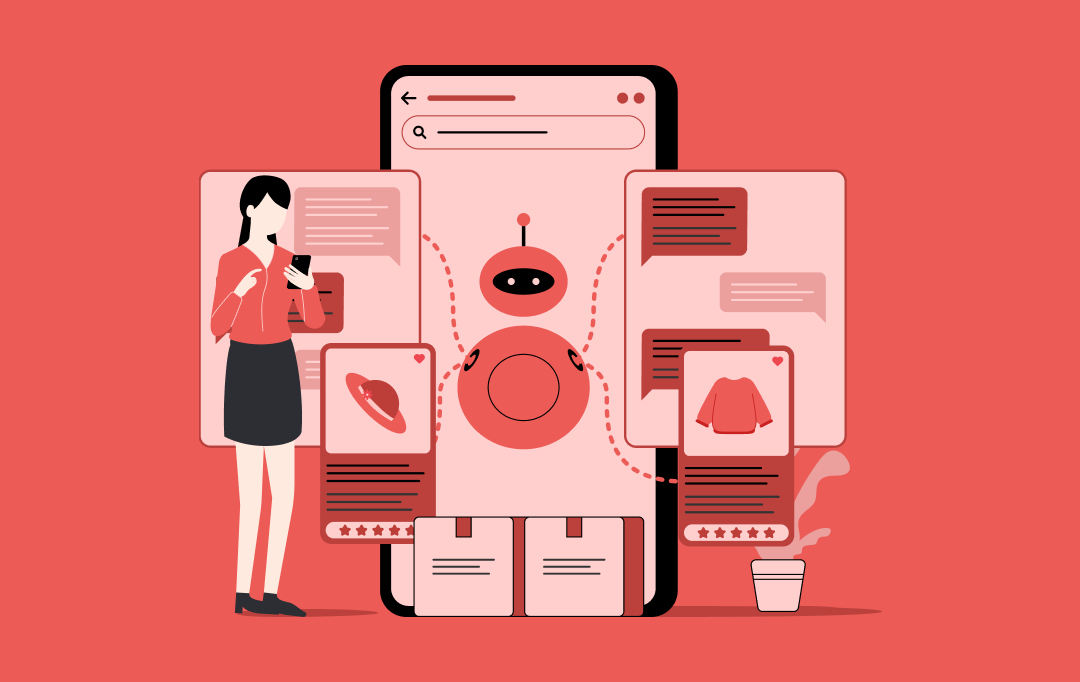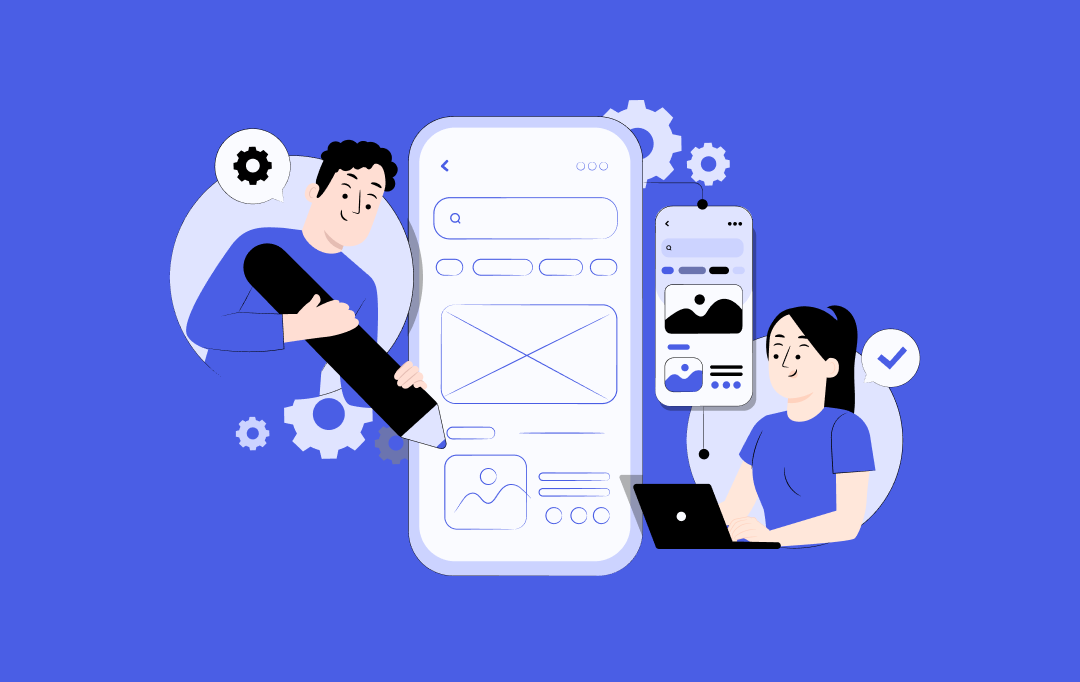- What is Katalon?
- How Much Does it Cost to Develop a Testing Tool like Katalon?
- Essential Features to Implement in an AI Testing Tool Like Katalon
- Test Script Generation
- Automated Test Execution
- AI-Powered Test Analysis
- Dynamic Object Identification
- Performance Testing
- Reporting and Analytics
- Collaboration and Version Control
- Security Testing
- Scalability and Flexibility
- Steps to Develop an AI Testing Tool Like Katalon
- Define Objective & Requirements
- Choose Technology Stack
- Integrate NLP and Codeless Automation
- Automated Test Execution and Data Management
- AI-Powered Test Analysis and Dynamic Object Identification
- Performance Testing and Reporting
- Collaboration, Version Control, and Continuous Improvement
- Create a Robust AI Testing Tool Like Katalon with Appinventiv
- FAQ’s
The software testing landscape has undergone a profound transformation with Artificial Intelligence (AI) integration. AI has brought about substantial improvements in both efficiency and precision, revolutionizing the field of software testing. AI’s role in software testing has developed from automating repetitive jobs to leveraging advanced algorithms for defect discovery, prediction, and smart decision-making.
The global AI-enabled testing market is expected to reach a valuation of $1.4 billion by 2030, with a projected growth rate of 18.4% from 2024 to 2030. Several factors contribute to the anticipated growth of the global AI-enabled testing market. These include quicker adoption of AI in software testing, advancements in machine learning algorithms, growing demand for efficient and automated testing solutions, and the consistent evolution of technologies driving the testing landscape.

Furthermore, the growing awareness among enterprises about the AI testing tool benefits in improving test efficiency, accuracy, and overall software quality plays a vital role in shaping the market size. This has made the stakeholders invest in AI testing tools like Katalon, wondering about the cost of developing one. On average, the Katalon-like AI testing tool development cost ranges from $50,000 to $500,000 or more.
Katalon, a top AI-enhanced testing platform, shows the potential of software testing using AI by offering features such as AI-supported testing, visual testing, and AI models that can generate tests. This blog will explore the cost to develop an AI testing tool similar to Katalon by considering the various factors and expenses tied to such a venture.
We will also discuss the various features of an app like Katalon and the steps to develop a similar app. However, first, let’s quickly grasp “What is Katalon.”
What is Katalon?
Katalon, an innovative quality management platform, offers a suite of tools for evaluating web applications, mobile apps, desktop programs, and APIs. With artificial intelligence-powered automation, it provides a seamless testing experience that balances simple configuration with complete customizability. Key elements like Katalon Studio function acts as an integrated development environment for automated test generation, supporting various platforms.
Katalon TestOps enhances collaboration by supplying visualized test data and results for teams. Widely adopted by over 850,000 users and 100,000 teams, Katalon is commended for its efficiency, quality assurance processes, collaborative features, ease of implementation, and incorporation of artificial intelligence.
Creating an application similar to Katalon provides companies effectiveness through swift test formation and comprehensive documenting. It guarantees top-tier software quality, promotes team cooperation, and allows for simple integration into present procedures.
Software testing using AI allows businesses to considerably enhance testing practices, improve software quality, and deliver high-performing testing solutions. Developing a Katalon-like application can transform testing, software quality, and team collaboration for superior digital products and applications.
How Much Does it Cost to Develop a Testing Tool like Katalon?
The development of an application similar to Katalon involves a complex and multifaceted process that is influenced by several key factors. These factors collectively determine the overall cost to develop an AI testing tool.
Development Team Costs
The project cost is intricately tied to the development team’s size and proficiency. Skilled professionals, including AI developers, machine learning engineers, and testers, play a pivotal role in shaping the overall expenses associated with the development process. The team’s expertise directly determines the successful implementation of intricate features.
Technology Stack
The next crucial step in the process is to select and implement the most suitable technology stack carefully. The selection of programming languages, frameworks, and AI libraries is a critical factor that impacts the cost of development. Opting for advanced technologies and tools that offer similar capabilities to Katalon may require a higher initial investment. However, this investment can be justified by the potential improvements in the performance and overall capabilities of the application.
Features and Functionality
The main factor that influences the Katalon-like AI testing tool development cost, is the choice of features and functionalities. In the development phase, the aim is to transform abstract AI features into practical functionalities. This involves creating AI-powered capabilities like natural language processing, self-healing tests, and predictive analysis.
Integration and Compatibility
The seamless integration of AI for software testing with various platforms, testing frameworks, and CI/CD tools greatly impacts the overall cost of AI testing software development. This phase of integration and compatibility ensures the tool’s versatility and widespread applicability.
This compatibility with different environments and systems introduces complexity, thereby affecting the overall development effort and contributing to increased expenses.
Regulatory Compliance
Adhering to specific industry regulations or standards becomes crucial because it entails additional efforts and costs. To ensure legal compliance, extra resources and expertise must be allocated to navigate and implement the necessary measures. This factor holds particular significance in industries with stringent regulatory requirements.
Testing and Quality Assurance
Ensuring the reliability and accuracy of the tool necessitates rigorous testing at every stage of development. The estimated Katalon-like AI testing tool development cost encompasses efforts of AI in quality assurance to detect and resolve any issues, ultimately delivering a robust testing tool.
Maintenance and Support
After the initial release, it becomes crucial to maintain the tool’s relevance and efficiency. The estimated yearly budget is allocated for regular updates, bug fixes, and ongoing user support. This allocation is a vital cost factor in mobile app development, as it ensures the app’s continued functionality, addresses emerging issues and provides ongoing assistance to users.
Marketing and Adoption
In order to attract users and achieve market adoption, it is crucial to promote the tool. The overall cost of marketing and adoption includes factors like advertising, outreach, and raising public awareness.
Documentation and Training
The creation of comprehensive user documentation and training materials plays a pivotal role in ensuring the effective utilization of the AI testing tool. Regularly updating these resources further enhances user proficiency and adds to the overall cost of AI testing tool development.
Essential Features to Implement in an AI Testing Tool Like Katalon
To create an AI testing tool similar to Katalon, it is crucial to integrate various essential features to ensure optimal functionality and user-friendliness. Below are the fundamental features that should be included in an AI testing tool.

Test Script Generation
In order to improve user-friendliness, the AI testing tool must be integrated with Natural Language Processing (NLP) functionalities. This particular capability transforms ordinary English requirements into test scripts, thus ensuring accessibility for individuals without technical expertise. Moreover, the tool should facilitate codeless automation, offering a straightforward interface for creating test cases without the need for coding proficiency.
Automated Test Execution
To ensure compatibility across different environments, a thorough artificial intelligence (AI) testing tool must have the capability to support cross-browser and cross-platform testing. This means the tool should be able to conduct testing across multiple browsers and platforms to ensure that the AI functions properly in all scenarios.
Additionally, the tool needs to allow for simultaneous execution of multiple test cases, optimizing both time and resources. This enables efficient testing and reduces the overall duration of the testing process. Furthermore, seamless automation in the development pipeline can be achieved by integrating the AI testing tool with widely used Continuous Integration (CI) tools such as Jenkins, Travis CI, or GitLab CI. This integration ensures a smooth flow of automated testing throughout the development process.
AI-Powered Test Analysis
Effective problem identification relies on intelligent analysis. The tool’s efficiency can be greatly improved by incorporating predictive analytics using historical test data and conducting root cause analysis to diagnose test failures.
Dynamic Object Identification
The AI testing tool must be capable of self-repairing to accommodate modifications to the application’s user interface. Furthermore, the integration of machine learning for object recognition guarantees precise interaction with UI components, regardless of any alterations in their attributes.
Performance Testing
The tool must offer functionalities for conducting load testing, which involves simulating many users and examining the system’s performance across different loads. It is also crucial to have stress testing capabilities to assess the application’s stability under extreme conditions.
Reporting and Analytics
A strong reporting system is essential in order to monitor test results. Configurable dashboards and in-depth reports that provide valuable information on test execution, coverage, and defect tracking are key components for conducting thorough test analysis.
Collaboration and Version Control
Efficiently managing test scripts necessitates seamless integration with version control systems like Git. It is important to include collaboration features within testing environments that facilitate the sharing of test assets and facilitate effective teamwork.
Security Testing
It is crucial that the tool incorporates features to thoroughly evaluate security, such as scanning for vulnerabilities and checking the safety of APIs. This allows it to find and fix any possible risks.
Scalability and Flexibility
By utilizing cloud-based resources, software testing can dynamically scale up and scale down based on fluctuating demands. This enhances the scalability and efficient management of infrastructure. Furthermore, a plugin architecture permits users to broaden the tool’s capabilities by connecting with third-party add-ons. This adaptable design means the testing suite can evolve alongside changing needs.
Steps to Develop an AI Testing Tool Like Katalon
Embarking on the development of an AI testing tool similar to Katalon demands a systematic approach. Here’s a comprehensive, step-by-step guide to help you kickstart the process:

Define Objective & Requirements
The objectives of your AI testing tool should be clearly expressed. It is essential to outline the specific testing scenarios that the tool should cover, be it functional, performance, security, or a combination thereof.
Additionally, you need to define the desired level of automation and specify the AI capabilities that you aim to integrate. To ensure that the tool aligns with the requirements of your users, gather their input through surveys, interviews, or collaborative efforts. This will help ensure that the tool meets their needs effectively.
Choose Technology Stack
When selecting a technology stack for your development team, it is crucial to consider the testing tool’s skills and requirements. Look for programming languages, frameworks, and libraries offering necessary flexibility and scalability. It is also important to consider factors such as ease of integration, maintenance, and community support. Doing so can establish a solid foundation for your AI testing tool.
Integrate NLP and Codeless Automation
To enhance the functionality of the tool, Natural Language Processing (NLP) can be integrated. This integration will enable the tool to comprehend and convert plain English requirements into executable test scripts.
Moreover, a user-friendly interface can be developed, allowing non-technical team members to create test cases without the need for coding. By adopting this codeless automation approach, the process of test case creation can be streamlined, making it more intuitive and efficient.
Automated Test Execution and Data Management
Testing across various browsers and platforms requires automated execution features. Additionally, implementing parallel execution can optimize testing time. It is crucial to integrate the features seamlessly into the development pipeline by leveraging CI tools like Jenkins or GitLab CI.
Furthermore, it is important to develop robust test data management capabilities, including support for parameterized testing and integration with external data sources. This will enable data-driven testing, which enhances the effectiveness and efficiency of the testing process.
AI-Powered Test Analysis and Dynamic Object Identification
AI algorithms are seamlessly integrated into the system to perform predictive analytics. This allows for a thorough analysis of past test data to proactively detect potential issues before they manifest. To further enhance efficiency, a root cause analysis mechanism intelligently diagnoses any test failures and offers actionable suggestions for rectification.
Moreover, the implementation includes a self-healing feature powered by AI, enabling seamless adaptation to changes in the application’s user interface. As a result, test scripts remain highly effective, even when UI elements undergo modifications.
Performance Testing and Reporting
In order to evaluate the performance of a system in various scenarios, it is necessary to develop features for load testing. These features will simulate a large number of users and assess how the system handles the load. Additionally, stress testing capabilities should be implemented to test the stability of the application under extreme conditions. To provide valuable insights into the test results, coverage, and defect tracking, a robust reporting system with customizable dashboards needs to be created. These reports should offer comprehensive analytics for effective test analysis and decision-making.
Collaboration, Version Control, and Continuous Improvement
To streamline the process, the AI testing tool will seamlessly integrate with Git and other version control systems. This will enhance test script management, ensuring efficiency. Additionally, the tool will incorporate collaboration features, enabling users to share test assets and work together on test case development.
Cloud-based testing capabilities will be implemented to improve scalability and resource management. To stay ahead, ongoing updates will address emerging challenges, adopt new technologies, and incorporate user feedback for continuous improvements.
Create a Robust AI Testing Tool Like Katalon with Appinventiv
The development of a testing tool like Katalon demands a substantial financial investment. However, the potential benefits it offers in terms of increased efficiency, accuracy, and software quality cannot be overlooked. It is crucial to consider the various factors that contribute to the cost of developing an AI testing tool to make well-informed decisions throughout the development process.
Embark on a transformative journey for your testing procedures with the potent force of AI with our tailored AI software development services, meticulously crafted to cater to your unique requirements. Our track record includes successful collaborations with startups such as YouCOMM, Vyrb, EdFundo, and JobGet, as well as renowned global brands like KFC, IKEA, Adidas, and many more.
Elevate your testing experience and enhance software quality through our profound expertise in AI and software development. Connect with our experts today to get an intuitive AI testing app like Katalon build.
FAQ’s
Q. How much does it cost to develop an AI testing tool like Katalon?
A. The cost to create an AI testing tool like Katalon might differ significantly depending on features, complexity, and other resources available for development. A basic AI testing tool costs between $50,000 and $100,000, whereas a more advanced version with additional and complex features can cost up to $500,000. Getting accurate cost estimates necessitates a thorough project analysis that takes particular requirements and objectives into consideration. Connect with our experts today to get the complete cost estimation of developing an AI testing tool like Katalon.
Q. How long does it take to develop an AI testing tool like Katalon?
A. The time required to develop AI tools for software testing can vary depending on factors such as the extent of its features, complexity, and team size. On average, it can take 6-18 months to create a robust and feature-rich tool. Read this blog to understand how long it takes to develop an app.
Q. What is an AI testing tool, and how does it differ from traditional testing tools?
A. An AI testing tool utilizes the power of artificial intelligence to enhance testing processes. It offers a range of features such as AI-supported testing, dynamic object identification, and predictive analytics. The AI-based automation testing tools are different from traditional ones in their ability to provide advanced capabilities for smarter test analysis, adaptive UI interaction, and improved defect prediction.
Q. Can the AI testing tool support cross-browser and cross-platform testing?
A. Yes, AI testing tools like Katalon have been specifically developed to facilitate cross-browser and cross-platform testing. Using these tools, you will be able to perform testing on different browsers and platforms, allowing you to evaluate the functionality of an application in different settings.



10 Use Cases and Benefits of How AI Agents Are Revolutionizing the Retail Industry
Key takeaways: AI agents in the retail industry are revolutionizing businesses by enhancing customer experience and streamlining operations. From personalized recommendations to predictive analytics, AI offers tangible benefits like increased conversions and reduced costs. AI adoption can lead to scalable growth and a competitive edge in the retail industry. Retailers must consider data strategies, talent…

12 Ways AI is Revolutionizing the Fashion Industry
Key takeaways: AI in fashion is booming, with a market value of $28.48 billion by 2032 and a 39.43% CAGR. It's transforming design, trends, shopping, manufacturing, and customer service. Top brands like Zara and H&M report 200% higher conversions, 64% fewer returns, and 25% better retention. Success demands strategy, data infrastructure, and phased AI integration…

How Much Does It Cost to Build an App like Janitor AI?
Key takeaways: Cost Breakdown: The cost of app development varies, with an MVP App costing $40,000 to $90,000, a Mid-Tier App costing $100,000 to $200,000, and an Enterprise Grade App costing $300,000 to $ 500,000 or more, depending on features, complexity, and the expertise of the development team. Key Factors: Platform choice, AI integration, and…


















